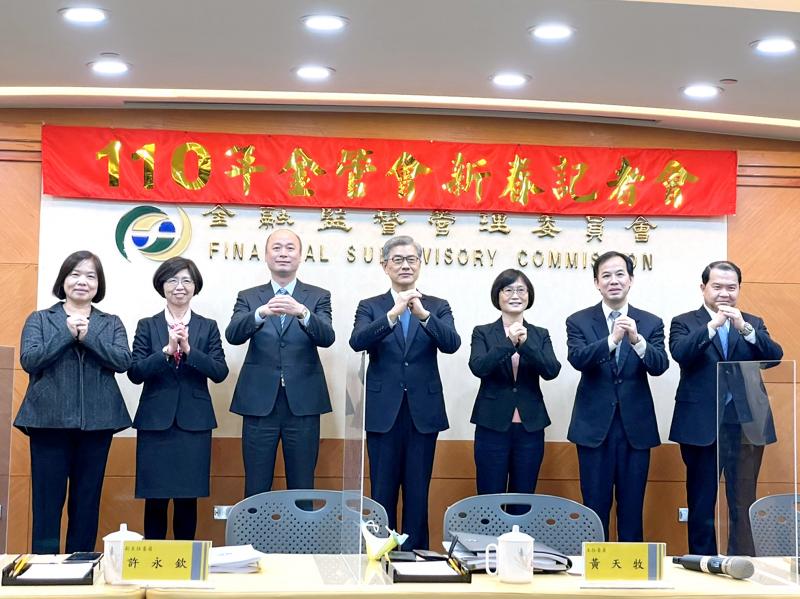The Financial Supervisory Commission (FSC) yesterday said that it is considering raising the cap on sales of insurance policies denominated in foreign currencies from 35 to 40 percent, which would allow life insurers an additional NT$690 billion (US$24.36 billion) of overseas investment.
Although the central bank in November last year recommended that the commission increase the cap to 45 percent, the commission does not approve of a sudden increase of 10 percentage points, as even a change of 1 percentage point can markedly affect the market, Insurance Bureau Director-General Shih Chiung-hwa (施瓊華) told a news conference in New Taipei City.
“We will elevate the ceiling in increments — five percentage points will be enough for now,” Shih said.

Photo: Kelson Wang, Taipei Times
So far, no major life insurers have reached the limit, but a few middle-sized players have approached it, she said, adding that the bureau would announce a final decision in the next month or two.
A preliminary assessment has shown that if the limit was raised to 40 percent, life insurers could invest NT$690 billion more abroad without it being counted as part of their overseas investments, Shih said.
The central bank last year advised the commission to raise the cap, allowing life insurers to sell more policies denominated in US dollars so that the demand for the greenback would rise and ease the appreciation of the New Taiwan dollar.
However, a recent proposal by the Life Insurance Association prompted the commission to review its regulations, Shih said.
The association recommended that the FSC raise the cap as it expects consumer demand for policies denominated in foreign currencies to continue to grow this year, after the policies made up 60 percent of total sales last year, Shih said.
If life insurers are allowed to sell more policies denominated in foreign currencies, they must inform policyholders of the foreign-exchange risks, she added.
However, FSC Chairman Thomas Huang (黃天牧) said that he would not in the short term consider relaxing the 45 percent cap on total overseas investments that life insurance companies must follow.
“Life insurers still have demand to put their money overseas, but the demand is expected to be lower than before, as growth of first-year premiums has slowed,” Huang said.
Separately yesterday, Taiwan Fire & Marine Insurance Co (台灣產物保險) said that it has received 3 million applications for its COVID-19 insurance policy, which has garnered attention since its launch in December last year because it offers to compensate up to NT$100,000 for those in quarantine, the company said in a post on its Web site.
As the number is too high to process rapidly, the property insurer said that it plans to approve all of the applications by the end of June.
Only five policyholders have so far applied for compensation from the insurer, FSC data showed.

Merida Industry Co (美利達) has seen signs of recovery in the US and European markets this year, as customers are gradually depleting their inventories, the bicycle maker told shareholders yesterday. Given robust growth in new orders at its Taiwanese factory, coupled with its subsidiaries’ improving performance, Merida said it remains confident about the bicycle market’s prospects and expects steady growth in its core business this year. CAUTION ON CHINA However, the company must handle the Chinese market with great caution, as sales of road bikes there have declined significantly, affecting its revenue and profitability, Merida said in a statement, adding that it would

RISING: Strong exports, and life insurance companies’ efforts to manage currency risks indicates the NT dollar would eventually pass the 29 level, an expert said The New Taiwan dollar yesterday rallied to its strongest in three years amid inflows to the nation’s stock market and broad-based weakness in the US dollar. Exporter sales of the US currency and a repatriation of funds from local asset managers also played a role, said two traders, who asked not to be identified as they were not authorized to speak publicly. State-owned banks were seen buying the greenback yesterday, but only at a moderate scale, the traders said. The local currency gained 0.77 percent, outperforming almost all of its Asian peers, to close at NT$29.165 per US dollar in Taipei trading yesterday. The

RECORD LOW: Global firms’ increased inventories, tariff disputes not yet impacting Taiwan and new graduates not yet entering the market contributed to the decrease Taiwan’s unemployment rate last month dropped to 3.3 percent, the lowest for the month in 25 years, as strong exports and resilient domestic demand boosted hiring across various sectors, the Directorate-General of Budget, Accounting and Statistics (DGBAS) said yesterday. After seasonal adjustments, the jobless rate eased to 3.34 percent, the best performance in 24 years, suggesting a stable labor market, although a mild increase is expected with the graduation season from this month through August, the statistics agency said. “Potential shocks from tariff disputes between the US and China have yet to affect Taiwan’s job market,” Census Department Deputy Director Tan Wen-ling

UNCERTAINTIES: The world’s biggest chip packager and tester is closely monitoring the US’ tariff policy before making any capacity adjustments, a company official said ASE Technology Holding Inc (日月光投控), the world’s biggest chip packager and tester, yesterday said it is cautiously evaluating new advanced packaging capacity expansion in the US in response to customers’ requests amid uncertainties about the US’ tariff policy. Compared with its semiconductor peers, ASE has been relatively prudent about building new capacity in the US. However, the company is adjusting its global manufacturing footprint expansion after US President Donald Trump announced “reciprocal” tariffs in April, and new import duties targeting semiconductors and other items that are vital to national security. ASE subsidiary Siliconware Precision Industries Co (SPIL, 矽品精密) is participating in Nvidia